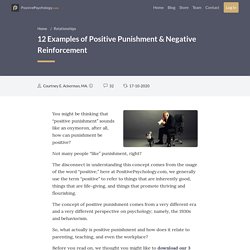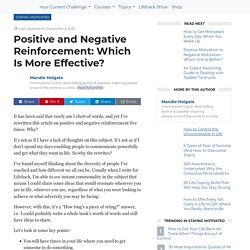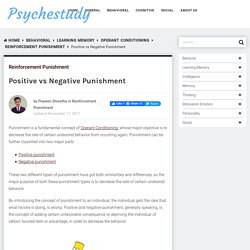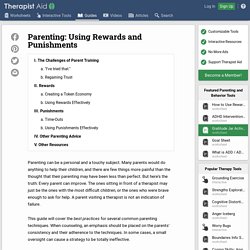

Operant Conditioning (B.F. Skinner) How Reinforcement and Punishment Modify Behavior Operant conditioning, also known as instrumental conditioning, is a method of learning normally attributed to B.F. Skinner, where the consequences of a response determine the probability of it being repeated. Through operant conditioning behavior which is reinforced (rewarded) will likely be repeated, and behavior which is punished will occur less frequently. By the 1920s, John B. Watson had left academic psychology, and other behaviorists were becoming influential, proposing new forms of learning other than classical conditioning. Operant conditioning: Positive-and-negative reinforcement and punishment. Pros and Cons of Punishment and Reinforcement in Operant Conditioning - Nursing Writing Service.
12 Examples of Positive Punishment & Negative Reinforcement. You might be thinking that “positive punishment” sounds like an oxymoron, after all, how can punishment be positive?

Not many people “like” punishment, right? The disconnect in understanding this concept comes from the usage of the word “positive;” here at PositivePsychology.com, we generally use the term “positive” to refer to things that are inherently good, things that are life-giving, and things that promote thriving and flourishing. The concept of positive punishment comes from a very different era and a very different perspective on psychology; namely, the 1930s and behaviorism. Reinforcement Theory. Difference Between Positive and Negative Reinforcement. Positive and Negative Reinforcement: Which Is More Effective? It has been said that rarely am I short of words, and yet I’ve rewritten this article on positive and negative reinforcement five times.

Why? It’s not as if I have a lack of thoughts on this subject. It’s not as if I don’t spend my days enabling people to communicate powerfully and get what they want in life. So why the rewrites? I’ve found myself thinking about the diversity of people I’ve coached and how different we all can be. However, with this, it’s a “How long’s a piece of string?” Let’s look at some key points: You will have times in your life where you need to get someone to do something.You will have times when someone needs you to do something. Let’s look at how positive and negative reinforcement would work. Someone may resist your desire for them to change.Someone may challenge your authority or leadership.Someone may be at risk of getting hurt. Positive Punishment in Operant Conditioning [Definition & Examples] Positive punishment is often used in life when we want to suppress unwanted behavior.
![Positive Punishment in Operant Conditioning [Definition & Examples]](http://cdn.pearltrees.com/s/pic/th/punishment-conditioning-239609851)
Let’s examine its definition, usage and examples, especially when it comes to parenting. What is Negative Punishment (Examples and Effectiveness) In this article, we will review negative punishment, its definition, examples, and drawbacks.

American psychologist B.F. Skinner developed the theory of operant conditioning, which stated that a person or animal’s behavior could be increased or decreased by adding or removing appropriate stimuli after the behavior is exhibited. Positive vs Negative Punishment - Psychestudy.
Punishment is a fundamental concept of Operant Conditioning, whose major objective is to decrease the rate of certain undesired behavior from occurring again.

Punishment can be further classified into two major parts These two different types of punishment have got both similarities and differences, as the major purpose of both these punishment types is to decrease the rate of certain undesired behavior. By introducing the concept of punishment to an individual, the individual gets the idea that what he/she is doing, is wrong. Positive and negative punishment, generally speaking, is the concept of adding certain unfavorable consequence or depriving the individual of certain favored item or advantage, in order to decrease the behavior.
What Is Operant Conditioning for Parenting? - Parentology. Parenting: Using Rewards and Punishments (Guide) Parenting can be a personal and a touchy subject.

Many parents would do anything to help their children, and there are few things more painful than the thought that their parenting may have been less than perfect. But here's the truth: Every parent can improve. The ones sitting in front of a therapist may just be the ones with the most difficult children, or the ones who were brave enough to ask for help. A parent visiting a therapist is not an indication of failure. This guide will cover the best practices for several common parenting techniques. Most of the advice in this guide—unless noted otherwise—is effective for teenagers as well as younger children.
The Challenges of Parent Training "I've tried that. " Before asking for help, most parents have tried it all. As a therapist, it's important to take special care listening to what a parent has tried, what has worked, and what hasn't worked. Regaining Trust Rewards This guide covers rewards before punishments for a reason. Punishments. Rewarding behavior is key to parenting teens, study suggests. Parenting is hard, and parenting teens brings about an entirely new set of challenges, from keeping their rooms clean to getting them home before curfew.

But, a new study suggests parents who want their teenagers to keep their grades up could have better success if they focus more on rewarding good behavior and less on threatening to punish the bad. According to the report, published in PLOS Computational Biology, British researchers have found that adolescents focus well on positive incentives, but have difficulty staying motivated to avoid penalties. The study shows that teens and adults learn in different ways, according to the study’s lead author Stefano Palminteri, a researcher with the Institute of Cognitive Neuroscience at University College London. It suggests that “in some cases positive feedback may have more of an effect than negative feedback on learning” in adolescents. “Rewards give them something they want to think about,” Allen said.
"When people go to work they get paid. How to Reward Your Teen for Good Behavior. Teenagers are young adults who are trying to learn the ways of the world.

When they do something great at school or at home or simply make a healthy decision, parents can give them a reward. The reward does not have to be money, but it is a nice way to say "thank you" or "I'm proud of you. "